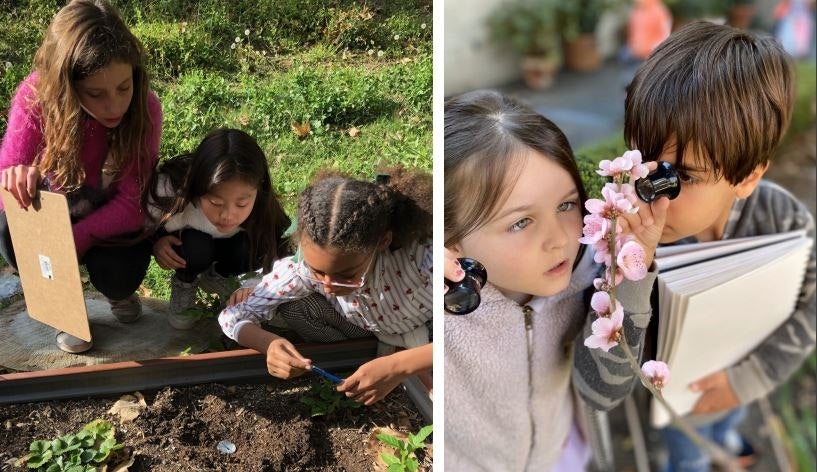Teacher researchers in the UCLA Department of Education have recently released a brief on “Using Pedagogical Documentation to Enhance Inquiry-Based Teaching & Learning: The Power of Reflective Practice for Teachers and Students,” based on a three-year study through a partnership with UCLA Lab School, the UCLA School of Education and Information Studies, and UCLA CONNECT.
The brief was written by Sylvia Gentile, demonstration teacher and inquiry initiatives facilitator, UCLA Lab School; Judith Kantor, demonstration teacher and teacher librarian, UCLA Lab School; and Nicole Mancevice, assistant professor-in-residence, UCLA Department of Education. Contributions to the brief were made by the Inquiry and Documentation Teacher Action Research Team of 14 teacher representatives from all learning levels at UCLA Lab School during the first three years of the project, and by Laura Weishaupt, communication director at UCLA Lab School. The project was also supported by the Cotsen Foundation for the ART of TEACHING.
The brief introduces pedagogical documentation and summarizes what UCLA Lab School teachers have learned from their research. The findings are presented so that educators in other school contexts may consider the possibilities for pedagogical documentation in their own classroom communities. As the study continues with UCLA Lab School faculty, the research team hopes to hear from other schools that have adapted the practice of pedagogical documentation and how it has enhanced teaching and learning in their classrooms.
“The action research project fostered a sense of community and built capacity for pedagogical documentation within UCLA Lab School,” says Mancevice. “The research team wrote this practitioner brief to invite teachers beyond the school into a professional dialogue about how documentation can support teaching and learning.”
The practice of pedagogical documentation, which originates from the Reggio Emilia approach to preschool education, is part of everyday learning at UCLA Lab School. Students from Early Childhood through Upper Level regularly reflect on their own learning processes and changes in their thinking over time. Both students and teachers document these changes in writing, photographs, drawings, and recordings, the process of which encourages students to consider their own thinking and that of their peers, while enabling teachers to listen closely to children’s voices and to follow their ideas in order to better plan their teaching.
“The students were amazing documenters, taking up the camera or the clipboard to record what went on in the classroom and reflecting on it later to extract kernels of ‘the good stuff,’ as they would say,” Gentile says. “We witnessed how amazing students are at documentation and self-reflection, and how valuable their insights are to teachers in planning and implementing lessons.”
“When students use documentation for self-reflection, they are more engaged and excited about what they are studying,” notes Kantor. “Documentation allows teachers to follow their students’ voices and interests, and provides students the opportunity to take even more responsibility for their own learning.”
The researchers note that pedagogical documentation can serve a vital purpose in today’s remote learning environment due to the COVID-19 pandemic.
“This practitioner brief reflects the work of a teacher-initiated research project to adapt and study instructional routines for documenting individual and collective learning over time,” says Mancevice. “Teachers involved students in the process so that they could learn from their peers and document their own progress. These routines for listening to, making records of, and reflecting on students’ thinking and problem-solving strategies are especially relevant in a remote learning context.”
“Whether in-person or remote, the more teachers can document students’ thinking and ideas, the more they will be able to engage students in the learning process,” says Kantor.
The brief includes descriptions of the team’s process of developing a shared understanding and purpose for documentation at UCLA Lab School; the methods, tools, and routines of documentation; activities in documentation specific to learners’ age levels; the use of documentation for reflection by students and teachers; and formative assessment.
The student population of UCLA Lab School reflects the diversity of the state of California, based on the most recent census data, with the school’s mission to participate in research and collaboration with public schools. The four levels are comprised of Early Childhood (4- to 5-year-olds); Primary (6- to 8-year-olds); Intermediate (8- to 10-year-olds); and Upper (10- to 12-year-olds).
To read the practitioner brief, click here.
For more information about UCLA Lab School, visit the website.
Photos: Courtesy of UCLA Lab School
